by Giriraja dasa Brahmacari (ISKCON-Bombay)
When the Hare Krsna chanters first appeared in America five years ago, Americans were surprised. Dressed in “Indian” dhotis and saris and chanting “Hindu” chants in Sanskrit, they were a novelty, but when they braved the winter snow and freezing temperatures to perform their sankirtana, people had to take them seriously.
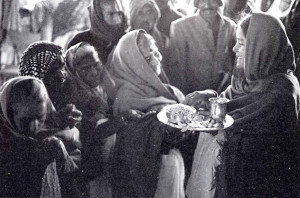
Now it is time for the Indians to be surprised. For the first time in many years, Indians in the downtown sectors of her major cities are seeing this same performance of sankirtana, as taught and popularized by Lord Caitanya Mahaprabhu, who adverted Himself in India, in West Bengal, 480 years ago. Yet instead of seeing Indians chanting, as one would expect in India, the Indians are astonished to see that the chanters are actually Americans and Europeans, dressed in the traditional garb of Indian sadhus or holymen. These American and European devotees are following the Vedic system even more strictly than the Indians. By dint of the determination and eagerness to chant the Lord’s praises, Indians are beginning to understand the purpose of their chanting. No longer are the devotees viewed as curiosities or public entertainment, as they were taken to be when first appearing in the West. The serious purpose of the Krsna consciousness movement is a wonderful and welcome surprise to all.
These surprises are the mercy of His Divine Grace A.C. Bhaktivedanta Swami Prabhupada, who came to America five years ago from India and just recently has returned to India from the West. As acarya or teacher for this modern age and founder of the International Society for Krishna Consciousness (ISKCON), Srila Prabhupada has been spreading the prime benediction for humanity—Lord Caitanya’s sankirtana movement—to peoples of all countries. As a pure devotee of the Lord, he is taken as His personal representative on this planet. He enjoys the direct association of Krsna, the Supreme Personality of Godhead, and due to his transcendental position, is a constant source of surprise.
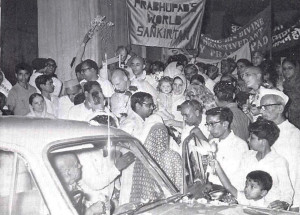
Srila Prabhupada has surprised the world with all his God-centered activities. The pure devotee shares in the qualities of Godhead, and therefore His Divine Grace is acintya, inconceivable, just like Krsna. His actions cannot be predicted. At the same time he is acyuta, infallible, for the pure devotee shares in none of the defects of the ordinary conditioned soul. The surprises provided by Srila Prabhupada are actually the surprises of the Supreme Personality of Godhead for whom Srila Prabhupada is the most confidential servitor and instrument. These surprises have actually been predicted by the great acaryas in disciplic succession, for such holy souls know something of the inner workings of the Lord.
Five hundred years ago Sri Caitanya Mahaprabhu, the avatara or appearance of Krsna in this age, predicted that His name would be sung in every country, village and town throughout the world. Srila Prabhupada is specifically fulfilling that prediction. Thirty-five years ago Sri Srimad Bhaktisiddhanta Sarasvati Gosvami Maharaja, the spiritual master of Srila Prabhupada, ordered his student to bring Krsna consciousness to the Western world. Srila Prabhupada has already furfilled that order. Furthermore, at the turn of this century, Srila Bhaktivinode Thakur, father of Sri Bhaktisiddhanta Sarasvati and acarya of the time, predicted that the preaching of Krsna consciousness would one day come back to India from the West. Srila Prabhupada is now in India fulfilling that surprising prophecy.
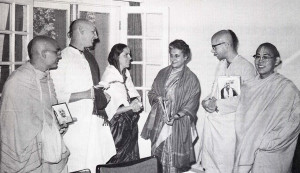
When His Divine Grace came to the United States, he told us, “You are living in the greatest country in the world. If you take to this Krsna consciousness movement, the whole world will follow your example.” Srila Prabhupada’s plan has come true. Having left India on the instruction of his spiritual master at a time when the chanting of Hare Krsna was unknown outside of India, Srila Prabhupada has made “Hare Krsna” a household term in innumerable homes throughout the world to the degree that he is now in the position of bringing Hare Krsna back to India from the outside. There have been Krsna conscious hit records, television appearances, feature stories, and praise from the government, the churches, and the elite. Most importantly, there has been the publication of twenty books on the science of Krsna in the English language as well as the establishment of Back to Godhead Magazine in six different languages with a monthly circulation of one half million. Thus Srila Prabhupada, who left India with only five dollars and a carton of Srimad-Bhagavatams, is returning to India having fulfilled the order of his spiritual master in just five years. With him he is bringing thirty of his Western disciples, 100,000 books, and the most amazing success story in the recent history of Western spiritualism, just to show the Indians how the West has taken to Krsna consciousness and how practical Krsna consciousness really is.
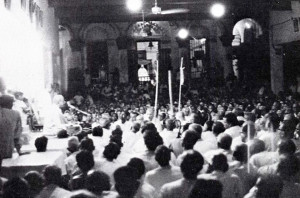
In profound humility, Srila Prabhupada attributes all his success to his Guru Maharaja. He says that his only greatness is that he has not adulterated the teachings of the scriptures and his Guru Maharaja, bul has presented them as they are, without personal motivation or interpretation, as they have been passed down through disciplic succession from Krsna Himself. He has taken as the prime duty of his life the fulfilling of the instructions of his Guru Maharaja, who, as a bona fide spiritual master, is a direct representative of Krsna. Here is the secret of his success. He has followed the instructions of his Guru Maharaja explicitly, not expecting personal results. For this selfless service and love, he has heen granted complete success by guru and by God. Any student who undertakes to fulfill the order of his guru, assured that his guru is a bona fide representative in the disciplic succession, is guaranteed success in his endeavors because the bona fide spiritual master is a representative of God. As the direct representative of the supreme authority, whatever instruction the spiritual master gives is backed up by the Supreme Personality, just as an agreement signed by a bona fide representative of a company is binding on the corporation, and the corporation is responsible for commitments made by its representative. Thus Srila Prabhupada was assured his surprising success by strictly followirig the order of his Guru Maharaja, who is in direct succession from the Supreme Personality of Godhead.
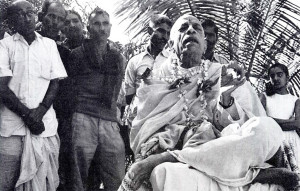
Still, Srila Prabhupada is endlessly exciting and ingenious, ever fresh and original and completely unpredictable in his plans to please the Lord and guru. How fortunate we are to witness the magnificence of his devotional service, as this chanting process turns this pandemonium of hell, our confusing material world, into Vaikuntha, the blissful spiritual abode of Krsna.
“We are so grateful to you for coming to us and showing us what you have learned. You have taken to this process—even greater than we have.” “Yes, we feel ashamed that you have had to come here to teach us our own religion.” “Yes, but what I want to know is what your parents thik of your converting.” These reactions have been common among many Indians we have met in India.
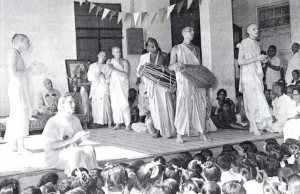
Indians are very anxiously observing the example of the West, desirous of becoming materially advanced like the Westerners, and they are forgetting Krsna. But we tell them that the West is disgusted with so-called material happiness and is now looking to India for spiritual guidance. In the past, India sent so many swamis who taught corrupt philosophies, preaching, “I am God, you are God, everybody is God, dog is God,” or “All is one, all is void; do whatever you want, and just transcend.” Such philosophies do not satisfy the spirit soul. But now the West has received a real source of transcendental knowledge and a respectable representative of Indian spiritual culture—His Divine Grace A.C. Bhaktivedanta Swami Prabhupada. He has given to the West what no other yogi has—the spiritual bliss of personalism, Krsna prema. Under his expert guidance, Srila Prabhupada’s disciples are very quickly advancing to the platform of transcendental ecstacy. They are living proof in India that where money, sex, alcohol, divorce, coffee, cigarettes, washing machines, telephones, electric can openers, newspapers, schools, poverty programs, hamburgers and milk shakes, TV dinners, caterers, hedonism, impersonalism, altruism, baseball, etc., have failed to bring happiness, Krsna has succeeded. Krsna is always successful because He is God. Now His pure representative has returned to India, to remind the people of their blissful heritage. Once again, this great nation is taking to the spiritual pathway of devotional service to God. Misconceptions about Krsna are rampant in India, but these can be cleared away by reference to revealed scripture.
He Is All Attractive
Is Krsna a Hindu God? No, for God is God, and though He is absolute, He has many names. One characteristic of God is that He is all-attractive, and the name Krsna denotes that all-attractive quality. So Krsna means God, and He is ultimately the same God worshiped by all religions everywhere. He is called Krsna in Bhagavad-gita, Yahweh in the Old Testament, and Jehovah in the New Testament. Lord Caitanya taught that God has invested all His potencies in all His names, and we should not consider that one name is any better than another.
Krsna is God, and He appeared on earth in His all-attractive feature or personal form to attract all species of life. In the Gita, (14.4), Krsna clearly states, “It should be understood that all species of life, O son of Kunti, are made possible by birth in this material nature, and that I am the seed-giving father.” Thus He is the God not only of Hindus, Christians and Jews, but also of lions, fish and trees. Just as the sun, although it rises in the East, cannot be called an Indian sun, similarly Krsna appeared in India, but in no way can He be called an eastern God. He is always present everywhere. Nowhere does He ever claim that He is a Hindu God or that He can take birth only in India. Krsna belongs to everyone. How else could so many persons in America relish transcendental bliss in Krsna consciousness? Krsna consciousness was unknown there five years ago and is just beginning to be recognized as a religion.
When Lord Caitanya, an incarnation of Krsna appeared in India five hundred years ago, He made lions, tigers, elephants—all animals—jump in ecstatic love for God. Just by chanting the Hare Krsna mantra and by hearing these sacred names of God, all living entities become purified.
Krsna consciousness is the eternal science of God, the living entity and nature. This science is true in all places and at all times, and, being transcendental, it is beyond the temporary designations of material time and space.
Many people ask if Hinduism is an Indian religion. The term “Hindu” itself is foreign to India and has nothing to do with the religion. The term “Hindu” was used by the Muslims to refer to the people living beyond the Indus River, or the “Hindus” River as they called it, since they were unable to pronounce the “I” at the beginning of “Indus.” Another term for Krsna consciousness is sanatana-dharma, or the eternal occupation of the living entity, namely to render service. Every bona fide religion teaches us to serve God. But since the term “Hindu” is unrelated to the actual practices of the worshipers across the Indus, it has been applied to any number of beliefs and practices in India, only some of which are in harmony with this Krsna consciousness movement.
If one’s goal is God, he will adopt whatever means are necessary to reach that end. Just as in material life, if one’s goal is to learn advanced technology and the best facilities for learning technology are in America, one will arrange to enroll in an American school. Similarly, if one’s goal is God, one must seek out that best process for realizing God in order to be successful. The Vedic literatures provide the most complete information about God in the world. According to the Vedas, the chanting of the holy name is the easiest means for contacting God in the present age. Therefore one must be practical and test out which process is actually bringing love of God, both by personal experience and by the results of others. Then one will find success.
God Is One
“Yes, yes. We worship all the gods—Rama, Siva, Krsna, Durga, Bala. They are all different names for the same Krsna. We are actually all God, so why limit yourself just to Krsna?” Just as in America there are so many Christians in name only, similarly in India there are many sentimental Hindus who have accepted their religion as tradition from their parents, but who are not acquainted with the actual science of Krsna presented by the disciplic succession according to the Vedas.
Are all the gods on the same level? No. The Vedanta-sutra defines the Absolute Truth as that from which everything emanates. The concept of the Absolute Truth is even superior to the concept God, or He who controls everything. The first verse of Srimad-Bhagavatam, the natural commentary on Vedanta-sutra, states that Krsna is that Absolute Truth, and in the Bhagavad-gita Krsna Himself says, “I am the source of everything; from Me the entire creation flows.” (Bg. 10.8) Arjuna, who is receiving this knowledge from Lord Sri Krsna, responds, “You are the invincible source, the cause of all causes.” At the same time, Krsna is worshiped as the Supreme Godhead in the first verse of Brahma-samhita (isvarah paramah krsnah). In the Gita, Krsna confirms, “The whole cosmic order is under Me,” (9.8) and Arjuna exclaims, “You are the Supreme controller.” (11.39). Thus Krsna, the Supreme Godhead, surpasses even the concept of God and is called the Absolute Truth.
He Appears In Many Incarnations
Nevertheless, Krsna manifests Himself in different forms. He is like the original candle from which many other candles of equal brightness and warmth are lit. Expansions of Krsna are also counted as God. They are actually Krsna, but the original form of Krsna is the source of all other forms. This is confirmed in Srimad-Bhagavatam. The Lord manifests Himself as Nrsimha, Vamana, Rama, Balarama, etc., for different purposes, yet all the abovementioned incarnations are either plenary portions or portions of the plenary portions of the Lord. Lord Sri Krsna, however, is the original Personality of Godhead: “Krsnas tu bhagavan svayam.” Similarly Krsna is like the many-faceted Vaidurya stone, which, although one, reflects its many facets in many different colors. Rama acts as an ideal king, Nrsimha reflects the feature of anger, but Krsna acts as the Supreme Personality of Godhead and is therefore the complete whole.
What is the relation between Krsna and Christ? Krsna is the father, and Christ is the son. In Bhagavad-gita, Krsna claims that He is the seed-giving father of all living entities. In the Holy Bible, Jesus claims that he is the son of God, so there is no contradiction. Actually God appears either directly or indirectly, either by descending Himself or by sending a representative. Both types of beings who descend from the spiritual world for the sake of reclaiming the fallen souls are called avataras, or incarnations. The direct avataras are direct expansions of the Lord and are Visnu-tattva or God, while the indirect incarnations are jiva-tattva or minute living entities who have been especially empowered by Krsna for some purpose. For example, Narada is a jiva soul in the feature of devotional service, Vyasa is considered a literary incarnation of the Lord, and Brahma is empowered with creative potency. But all jiva-tattvas, even incarnations, are the energy of God and therefore the servants of God. Still they may receive all the respect ordinarily paid to God because they are His pure representatives.
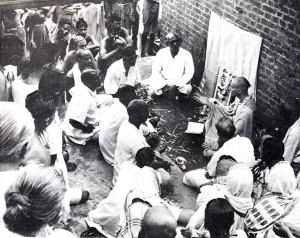
Some indirect incarnations descend to teach about God, while others employed by Krsna to administrate the affairs of the universe, are called demigods. Krsna is like a king, and the demigods are like His cabinet ministers. For example, Brahma is in charge of creation, Indra is in charge of the weather, and Durga is in charge of the material energy. In different ways, the demigods perform devotional service to Krsna with powers granted by Krsna. Siva is in charge of destruction and is a great devotee of Krsna, though not exactly an ordinary living entity. But in the Gita Krsna says, “Men of small intelligence worship the demigods, and their fruits are limited and temporary. Those who worship the demigods go to the planets of the demigods, but My devotees reach My supreme abode.” (7.23) Therefore it is a mistake to think that by worshiping any of the demigods or by chanting the names of the demigods one will achieve the same result as by worshiping Krsna. “Whatever a man may sacrifice to other gods, O son of Kunti, is really meant for Me alone, offered without true understanding. For I am the only enjoyer and the only object of sacrifice. They fall down who do not recognize My true transcendental nature.” (Bg. 9.22-23) Srimad-Bhagavatam explains that one who has surrendered to Krsna has no obligations either to demigods, sages, or people in general; just as watering the root of a tree automatically nourishes all the leaves, twigs and branches, so by serving the Supreme Lord one automatically satisfies all the demigods. Lord Jesus says, “Love God,” and Krsna says “Love Me,” so what is the contradiction? The true representatives of God tell us to surrender to God, just as Krsna tells us to surrender to Him. Therefore there is complete harmony of thought expressed in all the teachings.
Are we God? No. We are the energy of God, eternally related to God. We are like the sunshine and God is like the sun globe; wherever there is sun there is sunshine, and wherever there is sunshine there is sun. But the sunshine is not the same as the sun globe. We are infinitesimal, and God is infinite; therefore we are qualitatively one with God but quantitatively different. Now, however, our qualitative oneness with God is covered, due to our association with matter, and we must purify ourselves to realize our spiritual nature as part and parcel of Krsna. Krsna says, “The living entities are My parts and parcels eternally” (Bg. 15.7), so how can the part be equal to the whole? How can we be God?
Lord Caitanya taught that our constitutional position is that we are eternal servants of Krsna. In the conditioned state and in the liberated state we are eternally Krsna’s servants; we never become God. Liberation means to realize our constitutional position as servants of God. The hand is part of the body, and as it feeds the stomach it automatically becomes satisfied; but if the hand thinks, “Why should the stomach be all-in-all; I want to enjoy for myself,” and it sticks itself in some food and does not feed the stomach, then it will wither. We are pure spirit soul, part and parcel of Krsna, and our purpose in life is to serve the complete whole, the Supreme Lord Krsna.
God always remains God. He is God when He is playing on the lap of Mother Yasoda; He is God when He kills the Putana demon at the age of six months; He is God displaying His universal form on the Battlefield of Kuruksetra. He did not have to become God by meditation, penance or austerity, or by following the rules and regulations. God is substantially God. His manifestation is always present. As explained by Srila Prabhupada, “Krsna has nothing to do. If anyone has to do something to become God, he is a dog. He is not God. This one ean easily understand. If someone advertises that by meditation he has become God, or by worshiping such and such deity he has become God, you can immediately take it that he is a dog. The Vedic definition says that God does not have to do anything to become God. Therefore God is substantially God.”
Actually we are all in the material world because we wanted to forget Krsna. Therefore certain comments are not at all a surprise: “Because you come from a rich country, you can afford to spend your time chanting like this. When we become rich like you, we’ll do this too.” “Yes, why don’t you go back to your country and leave us alone? These philosophies have kept us back long enough. It is fine for you to chant, but what about the starving masses? It is hard to meditate on an empty stomach.”
When someone comes along to remind us of Krsna, we may use every excuse to avoid becoming Krsna conscious. Most people are used to thinking of themselves as the controllers, but to love God, one must concede that God is the supreme controller in all ways. No problem can exist independently of Him, nor can a solution be found without Him. Even economics is not a subject unrelated to Krsna. Problems such as poverty, starvation, poor housing, etc., are simply reflections or our forgetfulness of God. If the material necessities of life are used according to God’s instructions, economic problems will disappear. In Sri Isopanisad we learn that each person has an allotted quota of all necessities provided by the supreme father. Therefore, situations where one has too little or too much are due to ignorance of the laws which God has so mercifully revealed to us.
“Why Is There Suffering?”
Because God is always ready to give us what we desire, He has created the material world where we can assume the false position of controller, life after life, for as long as we like. Yet this material creation is marked by unpleasant conditions—birth, death, old age and disease—so that we may question, “Why am I suffering?” The search for an answer to such questions leads us to spiritual life and finally freedom from the cares of material existence. A nice example is given: The king may have all wealth in his kingdom, but the prisoners in the prison house never know it. Similarly, Krsna has His eternal, blissful, spiritual kingdom, but we are suffering in the material world due to our wanting to forget Him. The intelligent person will endeavor to get out of prison, to transfer to the spiritual world, rather than waste his time trying to make patchwork temporary adjustments to life in prison. “From the highest planet in the material world, down to the lowest, all are places of misery where repeated birth and death take place. But one who attains My abode, O son of Kunti, never takes birth again.” (Bg. 8.16)
Relatively happy and prosperous societies have existed within this world. But these rare societies were due to the grace of the Lord and His representative kings who followed the scientific Vedic system of organizing society. Such rulers were pure devotees or saintly kings like Lord Rama and Maharaja Yudhisthira. The kingdoms of the devotee kings knew material opulence far beyond anything we know today, and everyone was happy because they were working and receiving consciousness of God at the same time. In the materialistic societies people are not only unhappy and anxious due to their forgetfulness of God, but whatever wealth they do have is taken away by God’s agency of inexhaustible time. “Of subduers I am time.” (Bg. 10.30) Due to misusing God’s property, people in the United States will end up starving in poverty, whereas that society which recognized God’s proprietorship over all and appeals to Him, even if it be for material things will flourish.
Material existence is like a blazing forest fire which can be extinguished only by the raincloud of mercy from the bona fide spiritual master. No one starts a forest fire, yet automatically fires appear. Similarly, no one wants unhappiness in the material world, but automatically problems arise. But just as rainfall easily puts out a blazing forest fire, so the representative of God extinguishes our material suffering. Neither our own efforts nor those of family, friends, planning commissions and governing bodies can save us from misery and death. Only the ocean of mercy, Krsna, and His representative, the bona fide spiritual master, who pours forth mercy as a raincloud emits water, can extinguish our material existence. Theoretically we can understand that we cannot solve the problems of material life without God, and historically we can see that no society has been happy without God. “I am the goal, the upholder, the master, witness, home, shelter, and the dearmost friend.” (Bg. 9.18)
Use Krsna’s Things In His Service
Krsna consciousness is not contrary to life with material comforts; the point is to love God in whatever we are doing. Krsna instructed Arjuna in the Gita, “O Arjuna, surrendering all your works unto Me, with mind intent on Me, without desire for gain, and free from egoism and lethargy, fight.” (Bg. 3.30) The idea is that we should perform our prescribed duties only for the satisfaction of the Supreme Lord, with our consciousness fixed on the Lord. But even if we cannot surrender fully to the Lord, we can offer some of the fruits of our activities to God and remember Him while working by chanting Hare Krsna.
Thus money, airplanes, tape recorders, printing presses—all modern facilities—can be used for Krsna. But if our material facilities are used without reference to God, we are doomed. If one gives a bird a beautiful cage, keeps it clean, polishes and decorates it, and then never feeds the bird, the bird will certainly be unhappy and ultimately die. Similarly, if we use our modern civilization only to gratify, prolong, decorate and patch up the body, never feeding the soul within it, then surely the living entity will suffer and die. Therefore, Srila Prabhupada said to us in America, “You have wealth, beauty, friends, education—but they are all zeros. But if you put a one in front of all those zeros, you get millions, and that one is Krsna.” The point is not to give up anything; the point is to add love of God.
Everyone Is Won By Kirtana
We have traveled throughout India—to Calcutta, Bombay, Delhi, and to smaller cities too. We have been on the street, to conventions, in temples, and with the Prime Minister. Some people we have met have been convinced by our philosophy and some have not, but practically everybody is won by kirtana—the sound representation of Krsna. At religious conventions, monistic philosophers may rebuke us all day long, insisting that everyone is God—but by nightfall they are begging us to perform kirtana for them. Everyone is impressed that Srila Prabhupada has established his “New Vrndavana” in West Virginia with cows, forests, and temples modeled after the original Vrndavana of Lord Krsna in India. They marvel at his fifty centers established throughout the world, at the fifty thousand participants at his Rathayatra Festival in San Francisco, and at the monthly circulation of five hundred thousand Back to Godhead’s, to be increased to one million by the summer. The people of India, who are looking to the example of the West, are surprised to find Americans, Europeans, and Asians chanting Hare Krsna. Lord Caitanya, who is God Himself, is simply witnessing everything that He already knew would happen. His name is being sung in every village and town in all countries throughout the world; Krsna consciousness is being brought back to India from the West, and those who are chanting the Hare Krsna mantra are experiencing the ultimate goal of life: the transcendental bliss which comes from love of God.

Leave a Reply